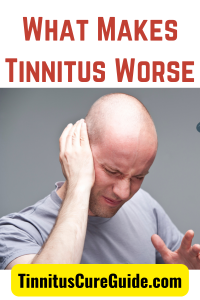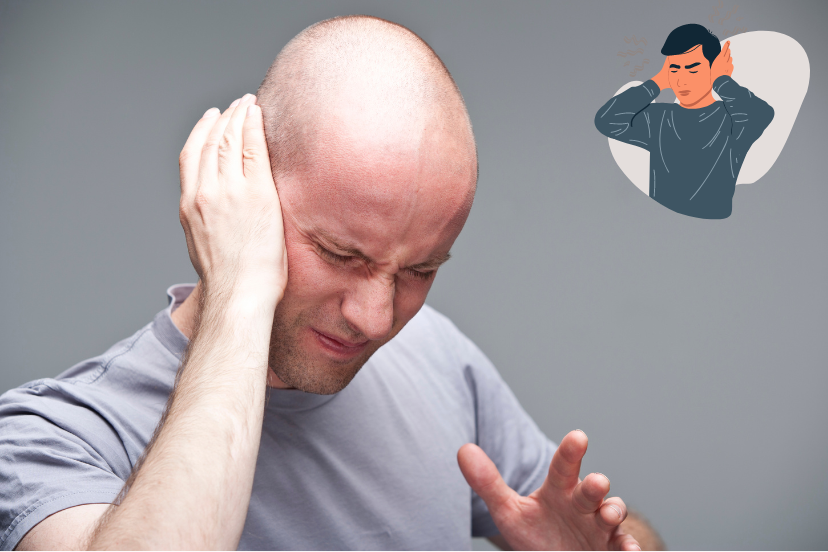What Makes Tinnitus Worse
Curious about tinnitus triggers? Discover the foods and factors that amplify ear-ringing symptoms. Learn about What makes tinnitus worse in this article. Tinnitus, often described as a persistent ringing or buzzing sound in the ears, can be a frustrating and disruptive condition. As someone passionate about hearing health, I understand the challenges individuals with tinnitus face. This article will explore the various factors that can worsen ear ringing and provide helpful suggestions to alleviate its impact.
Introduction
Tinnitus refers to the perception of sound in the absence of any external source. It can manifest as ringing, buzzing, hissing, or even roaring sounds. While ear ringing is not a disease itself, it is often a symptom of an underlying condition, such as hearing loss, ear damage, or circulatory system disorders.
Common Factors That Can Make Tinnitus Worse
Why Does My Tinnitus Change Pitch?
Tinnitus can change pitch due to various factors. One common reason is alterations in the auditory system caused by damage to the inner ear hair cells, leading to different neural activity. Changes in blood flow or muscle contractions near the ear can also impact tinnitus pitch. Additionally, stress and anxiety may influence perception. Understanding the underlying cause and seeking medical evaluation can help manage pitch fluctuations and tinnitus effectively.
Loud Noises And Exposure To Noise Pollution
Prolonged exposure to loud sounds, whether from recreational activities or occupational settings, can exacerbate tinnitus symptoms. It is crucial to protect our ears and limit exposure to high noise levels.
Stress And Anxiety
Stress and anxiety can intensify the perception of tinnitus. When we are stressed, our focus tends to shift toward the ear-ringing sounds, making them appear louder and more bothersome.
Poor Sleep Habits And Fatigue
Inadequate sleep and fatigue can worsen ear-ringing symptoms. When we are tired, our tolerance for the ringing or buzzing in our ears decreases, making it seem more intrusive.
Certain Medications And Medical Conditions
Some medications, including high doses of nonsteroidal anti-inflammatory drugs (NSAIDs), certain antibiotics, and cancer drugs, may contribute to tinnitus. Additionally, medical conditions like hypertension, otosclerosis, and temporomandibular joint (TMJ) disorders can exacerbate symptoms.
Smoking And Alcohol Consumption
Smoking and excessive alcohol intake can impair circulation and lead to increased tinnitus severity. It is advisable to reduce or eliminate these habits to minimize ear-ringing aggravation.
Harmful Habits And Activities To Avoid
To alleviate the impact of tinnitus, it is essential to avoid the following harmful habits and activities:
Listening To Loud Music Or Using Headphones Excessively
Prolonged exposure to loud music or using headphones at high volumes can damage the delicate structures of the inner ear and exacerbate ear-ringing symptoms. Opt for lower volume levels and take regular breaks.
Engaging In Activities With High Noise Levels
Participating in activities with high noise levels, such as attending concerts, using power tools, or riding motorcycles without ear protection, can significantly worsen tinnitus. Always wear earplugs or earmuffs in such situations.
Ignoring Ear Protection In Noisy Environments
In environments with loud machinery or industrial noise, it is crucial to prioritize ear protection. Neglecting earplugs or earmuffs in these situations can contribute to tinnitus aggravation.
Engaging In Stress Inducing Activities Without Relaxation Techniques
Stress is a common trigger for tinnitus. Engaging in stressful activities without implementing relaxation techniques, such as deep breathing exercises, yoga, or meditation, can intensify symptoms.
Neglecting Proper Sleep Hygiene
Inadequate sleep and fatigue can amplify the impact of tinnitus. Establishing a consistent sleep routine, creating a calming sleep environment, and practicing relaxation techniques before bed can improve sleep quality and reduce ear ringing severity.
Strategies To Minimize Tinnitus Aggravation
While it may not be possible to completely eliminate tinnitus, the following strategies can help minimize its aggravation:
Reduce Exposure To Loud Noises
Limit exposure to loud sounds by turning down the volume on electronic devices, wearing ear protection in noisy environments, and choosing quieter recreational activities.
Practice Stress Management Techniques
Incorporate stress management techniques into your daily routine. This can include activities like exercise, deep breathing exercises, mindfulness meditation, or engaging in hobbies that help you relax.
Promote Healthy Sleep Habits
Ensure you have a conducive sleep environment by reducing external noise and creating a relaxing bedtime routine. Avoid stimulants like caffeine and electronic screens before bed, and aim for a consistent sleep schedule.
Evaluate And Adjust Medications
If you suspect that certain medications are contributing to your ear-ringing symptoms, consult with your healthcare provider. They may be able to adjust your dosage or prescribe alternative medications that are less likely to worsen tinnitus.
Adopt A Healthy Lifestyle
Engage in regular exercise, eat a balanced diet, and maintain a healthy weight. A healthy lifestyle can positively impact overall well-being, potentially reducing the severity of ear-ringing symptoms.
The Role Of Diet And Nutrition
While there is no specific tinnitus diet, certain dietary considerations may help alleviate symptoms:
Avoid Trigger Foods And Beverages
Some individuals find that certain foods or beverages, such as caffeine, alcohol, nicotine, or high-sodium and processed foods, can worsen tinnitus. It may be beneficial to identify and avoid such triggers.
Incorporate Anti-Inflammatory Foods
Consuming a diet rich in anti-inflammatory foods, such as fruits, vegetables, whole grains, fatty fish (rich in omega-3 fatty acids), and nuts, may have a positive impact on ear ringing symptoms.
Stay Hydrated
Dehydration can exacerbate tinnitus. It is important to drink an adequate amount of water throughout the day to maintain proper hydration.
Consider Supplements
Some supplements, such as ginkgo biloba, zinc, magnesium, and B vitamins, have been suggested to potentially alleviate tinnitus symptoms. However, it is essential to consult with a healthcare professional before starting any supplements.
Hearing Protection And Devices

Using appropriate hearing protection and devices can significantly reduce tinnitus aggravation:
Use Earplugs Or Earmuffs In Noisy Environments
Whenever you find yourself in a noisy environment, such as concerts, sporting events, or construction sites, wearing earplugs or earmuffs can protect your ears from further damage and prevent ear ringing from worsening.
Consider Sound Masking Devices Or White Noise Machines
Sound masking devices or white noise machines can help mask the tinnitus sounds, making them less noticeable and providing relief for some individuals.
Explore Hearing Aids For Tinnitus Management
Some hearing aids are specifically designed to provide relief from tinnitus. They can amplify external sounds and offer customizable sound therapy options to alleviate the perception of tinnitus.
Mindfulness And Relaxation Techniques
Practicing mindfulness and relaxation techniques can positively influence tinnitus perception:
Practice Meditation And Deep Breathing Exercises
Meditation and deep breathing exercises can help redirect your focus away from the tinnitus sounds and promote relaxation. Incorporate these techniques into your daily routine for optimal benefits.
Engage In Yoga Or Tai Chi
Yoga and tai chi combine physical movement, breath control, and meditation, offering a holistic approach to managing stress and ear-ringing symptoms. Explore classes or online resources to get started.
Explore Cognitive-Behavioral Therapy (CBT) For Tinnitus
CBT is a type of therapy that helps individuals reframe their thoughts and emotions surrounding tinnitus. It can provide coping mechanisms and reduce the negative impact of tinnitus on daily life.
Seeking Professional Help And Support
If your ear ringing is significantly impacting your quality of life, consider seeking professional help and support:
Consult An Audiologist Or Otolaryngologist
Audiologists and otolaryngologists are specialists in hearing health and can assess your ear-ringing symptoms. They can provide guidance, recommend treatments, and offer coping strategies tailored to your specific needs.
Join Support Groups Or Seek Therapy
Connecting with others who are experiencing similar challenges can provide emotional support and valuable insights. Support groups or therapy sessions focused on ear ringing can be beneficial for managing the condition.
Consider Tinnitus Retraining Therapy (TRT) Or Other Specialized Treatments
TRT is a therapeutic approach that combines counseling and sound therapy to help individuals habituate to ear-ringing sounds. Other specialized treatments, such as neuromodulation or acupuncture, may also be options worth exploring.
What Foods Make Tinnitus Worse
While there is no direct evidence that specific foods cause tinnitus, certain dietary choices may exacerbate symptoms in some individuals. Excessive consumption of caffeine, found in coffee, tea, and energy drinks, may lead to heightened tinnitus perception. Salty foods can cause fluid retention and affect blood flow, potentially aggravating ear ringing. Processed foods and high-sugar diets might lead to inflammation, which may influence tinnitus severity. Additionally, some people report sensitivity to certain food additives like MSG. Adopting a balanced, low-sodium diet, reducing caffeine intake, and avoiding trigger foods can be beneficial for managing ringing in the ears and promoting overall health.
What Makes Tinnitus Better
Improvement in tinnitus can be achieved through various approaches. Firstly, identifying and addressing the underlying cause, such as earwax removal, treating infections, or managing stress, may alleviate symptoms. Adopting a healthy lifestyle with regular exercise, proper sleep, and reduced caffeine and alcohol consumption can contribute positively. Sound therapy, like white noise or masking sounds, can provide relief. Cognitive Behavioral Therapy (CBT) aids in coping with the emotional impact. Avoiding loud noises and protecting ears from harmful sounds prevents further damage. While there’s no universal cure, a multidimensional approach tailored to individual needs can significantly improve tinnitus and enhance overall well-being.
How Do You Deal With Severe Tinnitus
Managing severe tinnitus requires a comprehensive approach. Firstly, seek medical evaluation to identify and address any underlying causes. Use sound therapy techniques, such as white noise or sound masking, to provide relief from the persistent ringing. Cognitive Behavioral Therapy (CBT) can help manage distress and emotional impact. Employ relaxation techniques like meditation and deep breathing to reduce stress and anxiety. Limit exposure to loud noises and wear ear protection. Adopt a healthy lifestyle with regular exercise and adequate sleep. Explore support groups or counseling to connect with others experiencing ringing in the ears. Collaborate with healthcare professionals to develop a personalized treatment plan for optimal coping and improved quality of life.
Can You Live A Long Life With Tinnitus
Individuals can live a long and fulfilling life with tinnitus. Ringing in the ears is not life-threatening and doesn’t directly impact life expectancy. While the condition can be bothersome and affect the quality of life, many people adapt and manage it successfully. Individuals with tinnitus can minimize its impact by employing coping strategies, seeking appropriate medical attention, using sound therapy, and adopting a healthy lifestyle. Support from healthcare professionals, support groups, and loved ones can also help individuals navigate the challenges of tinnitus and lead a fulfilling life.
What Makes Tinnitus Worse – Conclusion
Several factors can exacerbate tinnitus, intensifying its impact on daily life. Exposure to loud noises, such as concerts or machinery, can further damage the auditory system and increase tinnitus severity. Stress and anxiety contribute to a heightened perception of ringing in the ears. Smoking and excessive alcohol or caffeine consumption may negatively affect blood flow, worsening symptoms. Certain medications can also trigger or aggravate ringing in the ears. Poor sleep habits and fatigue can exacerbate tinnitus-related distress. Additionally, underlying health conditions like hearing loss, infections, or temporomandibular joint disorder may amplify ear ringing. Understanding these aggravating factors and adopting preventive measures can help manage tinnitus effectively and improve overall well-being.
Please note that this article should not replace professional medical advice. Consult a healthcare professional for an accurate diagnosis and tailored treatment plan.
Frequently Asked Questions (FAQs)
Can stress make tinnitus worse?
Yes, stress can exacerbate ear-ringing symptoms. When stressed, our attention tends to focus more on the ear-ringing sounds, making them appear louder and more bothersome.
Are there any specific foods or drinks I should avoid if I have tinnitus?
Some individuals find that caffeine, alcohol, nicotine, and high-sodium or processed foods can worsen ear ringing. It may be helpful to identify any personal triggers and avoid them.
Can hearing aids help with tinnitus?
Yes, certain hearing aids are designed to relieve ringing in the ears. They can amplify external sounds and offer customizable sound therapy options, which can help alleviate the perception of tinnitus.
How long does tinnitus last?
The duration of tinnitus can vary significantly from person to person. For some individuals, ear ringing may be temporary and last for a few days or weeks, often due to exposure to loud noises or certain medications. In such cases, the ear ringing typically subsides once the underlying cause is addressed or removed. However, for others, ringing in the ears can be chronic and persist for months or even years.
What is the role of cognitive-behavioral therapy (CBT) in managing tinnitus?
CBT helps individuals reframe their thoughts and emotions surrounding ringing in the ears. It provides coping mechanisms and strategies to reduce the negative impact of ear ringing on daily life.
When should I seek professional help for my ear ringing?
If your ear ringing significantly impacts your quality of life, it is advisable to consult an audiologist or otolaryngologist. They can assess your symptoms, provide guidance, and recommend appropriate treatments.





